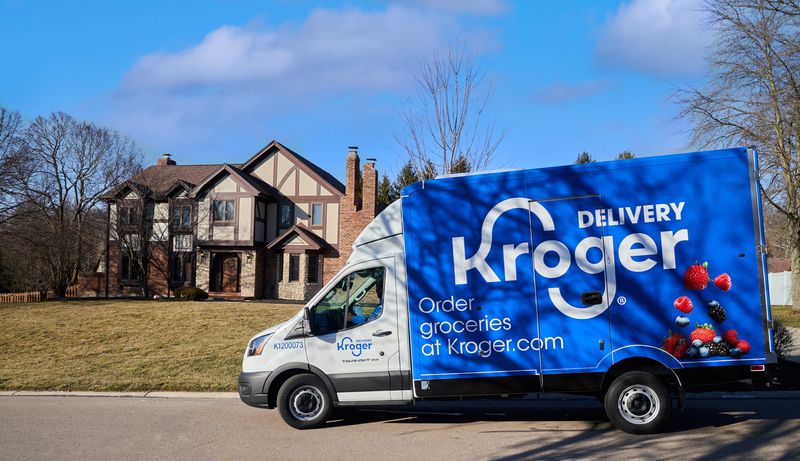By Ananya Mariam Rajesh
(Reuters) -Kroger topped quarterly same-store sales expectations on Thursday, benefiting from a surge in customers shopping for its lower priced and freshly sourced groceries at its stores and online.
The U.S. grocer, which competes with retail giants such as Walmart (NYSE:WMT) and Amazon.com (NASDAQ:AMZN), has been ramping up its e-commerce investments to keep pace with customers who prefer shopping online.
Kroger (NYSE:KR) rivaled Walmart's Thanksgiving deals and lowering the subscription fee for Walmart Plus subscription from October end to Dec. 2 with its own holiday offers.
It sold Thanksgiving meals for less than $5 and launched a 12-day deal from Dec. 4 where customers can avail a coupon every day on its website or mobile app.
"They're both (Walmart and Kroger) attacking online. They both want to be there for the consumer wherever the consumer wants to shop...and they are all getting better at the digital side of the food game," said Telsey Advisory Group analyst Joseph Feldman.
Kroger's third-quarter identical sales, excluding fuel, rose 2.3%, beating expectations of 1.77% rise, according to data compiled by LSEG, while its adjusted earnings per share of 98 cents was in line with the estimates.
But Kroger's shares slipped in choppy trading as the supermarket chain narrowed its annual forecasts, saying annualized sales will be about $3 billion lower due to the sale of its specialty pharmacy unit.
The recall of meat produced by Boar's Head hurt quarterly sales and would remain a near-term overhang, interim CFO Todd Foley said.
Kroger expects fiscal 2024 identical sales, excluding fuel, to grow between 1.20% and 1.50%, compared with prior forecast of 0.75% to 1.75%.
It forecast annual adjusted earnings per share between $4.35 and $4.45, compared with $4.30 to $4.50 estimated earlier.

Separately, CEO Rodney McMullen said Kroger is committed to closing its $25 billion mega merger with Albertsons (NYSE:ACI).
The companies are waiting for a decision following the anti-trust trial in September where the U.S. Federal Trade Commission and several states opposed the deal.